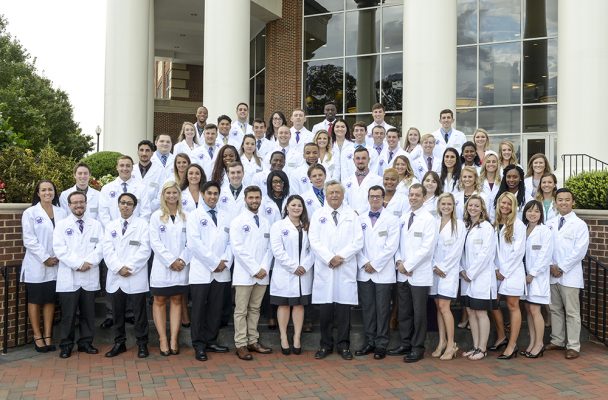HPU’s inaugural pharmacy program begins with the 2016 school year

Pictured is Fred Wilson with the first class of HPU pharmacy students. Photo by: highpoint.edu
By Erika Esterline// Staff Writer
The Congdon School of Health Sciences and the Fred Wilson School of Pharmacy may still be under construction, but the Doctor of Pharmacy program is well underway as the first class of 60 students has already received their white coats.
The pharmacy program is a six-year program where students are required to take two years in pre-pharmacy before applying for the four-year Doctor of Pharmacy program. The program has set out with a new mindset on health care, one that focuses on a collaborative style.
Dean Dr. Ronald Ragan explained, “We have been very intentional in the design of the program. We wanted to train students in a team environment and a very collaborative fashion because that’s how health care is practiced now and if students learn that way, there is a better chance that they are going to be an effective practitioner.”
“We have gone away from the model of health care where the mindset is ‘I am a pharmacist, I deal with drugs, I don’t really know what is going on in the other parts of a patient’s health care,’” Ragan said. “That doesn’t work anymore. Our focus is to prepare them for that environment.”
This mindset, as well as a couple of techniques employed by the school to bring students closer to being practice-ready, is what sets this pharmacy program apart from other universities. The first of which is the use of the standardized client, which allows the student to experience a real-world scenario in the classroom.
“We train actors to portray ill patients, family members of patients, physicians or nurses that we want our student pharmacists to interact with,” Ragan said. “We design those around cases that we get from the clinic so they are authentic cases and what we find is that if they have had the chance to interact with a physician, even if that physician is trained to portray one, they’re much closer to being ready to practice when they graduate.”
The second unique tool is referred to as the longitudinal patient care experience.
“Students are introduced to a patient in an adult living environment, then they maintain that relationship over the next three years,” Ragan said. “It’s about knowing how to establish a relationship over a number of years. Community pharmacists are the most accessible health care providers in our system and to be effective at that you not only have to be able to work in those teams, but you have to be able to develop relationships with your patients.”
Part of the program also includes a service aspect. For the first class, this meant wrapping up their three day orientation by working in the community, some through Habitat for Humanity and others in organizations with more of a health care focus.
“Students are out and learning what it’s like to be a part of their community and contribute to their community,” Ragan said. “A lot of their community service will be in health care related fields, but it doesn’t all have to be. I think that’s part of what is important about having the school of pharmacy in High Point. We get to address some of the health disparities out there, we get to help deal with some of the health care issues we see across the triad.”
In addition to giving back to the community, the program is also providing many opportunities and advantages to students.
“This is really applied science, so we get the opportunity to leverage the quality education the students get in their general studies here on campus, Ragan said. “We bring in pharmacology, pharmaceutics and medicinal chemistry and weave that all together to apply that science that you learned in your first semester in college. It adds another really powerful option for students at HPU and an applied option. It puts them in a role that is an important role in their communities when they graduate.”